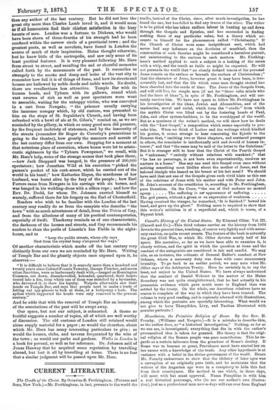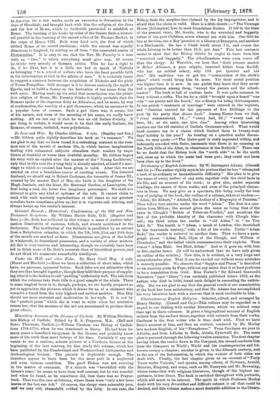Ilfonotheism, the Primitive Religion of Rome. By the Rev. H.
Formby. (Williams and Norgate.)—It is a mistake to describe this, as the author does, as " a historical investigation." Nothing, as far as we can see, is investigated; everything that fits in with the author's preconceived idea is taken for granted. His theory is that the origi- nal religion of the Roman people was pure monotheism. This he re- gards as a certain inference from the grandeur of Rome's destiny. If Rome was to become so great, Providence must have started her on her career with a knowledge of the truth. Any other hypothesis is at variance with a belief in the divine government of the world. Hence Mr. Formby endeavours to show that the idolatry of later ages was a corruption of an originally pure faith, and he maintains that the writers of the Augustan age were in a conspiracy to hide this fact from their countrymen. His method is one which, in those days, will meet with but scant approval. Numa Pompilius is with him a real historical personage, who (to use our author's own illustra- tion), just as a professional man now-a-days will run over from England to America for a few weeks, made an excursion to Jerusalem in the days of Hezekiab, and brought back with him the religion of the Jews and the law of Moses, which he forthwith proceeded to establish at Rome. The burning of his books by order of the Senate finds a histori- cal parallel in the burning of the sacred relics of St. Thomas Becket, in the reign of Henry VIII. Both were fatal acts, the first of which robbed Rome of its sacred traditions ; while the second was equally disastrous to England, by cutting us off from "the venerated centre of Christendom." It is easy to see that the Rev. Mr. Formby is a man with an "idea," to which everything must give way. Of course he thinks very meanly of German critics. This he has a right to do, if he likes, but it is a little too bad to speak of Niebuhr as belonging "to a school of writers who have the least possible faith in the intervention of God in the affairs of men." It is certainly funny to suggest a contrast between the scepticism of Niebuhr and the piety of Noma Pompilins. Still stranger is it to discuss seriously the myth of Egeria, and to build a theory on the derivation of her name from the verb egero. Having made up his mind that monotheism was the primi- tive religion of Rome, Mr. Formby thinks it highly probable that the Romans spoke of the supreme deity as Akissimus, and he notes, by way of confirmation, the worship of a god Summanus, which he assumes to be a popular form of summus. Such a god there was, it seems, but of his nature, and even of the meaning of his name, we really know nothing. All we can say is that he was an old Italian divinity. If one thing is certain, it would seem to be that the early Italians, the Romans, of course, included, were polytheists.



































 Previous page
Previous page